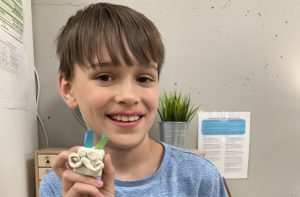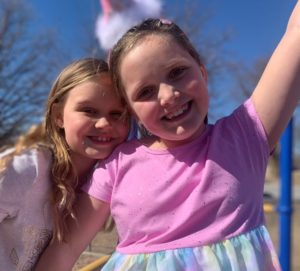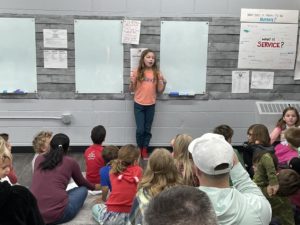Shaking his head back and forth quickly, he kept his hands tucked away under his legs, with a hint of fear in his eyes.
Sitting around in a circle for our daily launch, I could have guessed his response – for it was the same most days. Still, as the discussion leader, I kept asking – kept hoping – that my question would be the hook that this learner would grab onto one day and finally share his voice.
When Thatcher came to us, he was 4.5 years old. Full of energy, yet always with a watchful eye that would often catch mine. Rather than engaging in discussions or projects for himself, he could always be found observing the others. He was a sponge, soaking up all that was around him – and yet we couldn’t always see it, tucked deep away inside.
I remember the first time I saw a little window into his growth inside. After we had explored the idea of the “Challenge Donut” (one’s comfort, challenge and panic zones with doughnuts), during one short beloved hero’s journey video it mentioned, “We leave our comfort zone.” Right away, Thatcher shouted out, “Comfort zone!” like a special friend he had recognized. For someone who was so quiet and observing, hearing this connection confirmed that there was a lot more going on in Thatcher underneath the surface.
Weeks passed. Months passed. This week last year, COVID hit, and in a day our studio went virtual. It didn’t phase him initially. His learner-driven mindset and excitement to practice the sounds in words and make progress on Lexia led to an all-out explosion of reading – books of all kinds, all on his own.
Over this past year, he’s been on an internal journey – I can see him grappling with some deep things inside – like who he is, how he will learn, and how he will engage when things are hard. Indeed, there have been some hard things for him this year, between adjusting to a new feel in the studio with the addition of more learners, spending extra time at home due to COVID, and feeling the times when he just doesn’t want to do anything except cuddle up with a good book.
One morning, this internal journey came to a head – Thatcher decided that he would not come to school. I admired his mother. Rather than forcing him, or responding as a victim to this change in plans, she embraced this as a moment for deep learning. Calmly, and with great love, she gave him a choice: to go to school, or to do chores at home for the day. With great resolve, Thatcher calmly chose the chores. We both believed in Thatcher – that he would learn from this experience, and with respect honored his choice.
After a very clean house, this determined 6 year old let go of his guard and with authenticity acknowledged that he was truly excited to go to school the next day. I reminded him that if he was feeling sad, he was welcome to spend as much time in the reading corner as he needed. His eyes brightened and he saw a path to his healing – and success.
And read he did – many days spending much of his time there. As the weeks went on, he began to engage more and more, being drawn in by his friends. You could see his heart healing again.
Then, all of a sudden, it was like someone flipped a switch. From dark to light. As we were gathered around our circle for our morning launch, debating and co-creating the rules of a new game where the learners would earn points to unlock “Friday Fun”, Thatcher raised his hand confidently.
“Yes, Thatcher?” I asked, as I felt my eyebrows and smile lifting upward (yet trying so hard to keep my neutral, Socratic stance).
“I agree with George. Because it should be challenging.”
“Thank you for sharing your thoughts, Thatcher,” I responded. “Who agrees with Thatcher and George, that it should be challenging?” A flood of hands raised up.
This wasn’t the only time Thatcher began to share his voice.
A few weeks later, as Thatcher had continued to grow in confidence in our discussions, he began to take on the role of Socratic Cop. This is a role that is elected at the beginning of each circle, for a hero to hold us accountable to a specific rule of engagement we’ve agreed to – like raising our hands to speak, listening carefully with our whole bodies and respect, or making one short point so others can speak too.
During one circle, one of our older heroes began to speak in a high-pitched voice that wasn’t his own. I was curious to see if any of the heroes would notice or what they might do about it.
Thatcher raised his hand to speak. “You are speaking in a baby voice. I wish you would speak like a 10-year-old instead.”
The room was quiet. Our oldest hero was just held accountable by one of the youngest – at at that, a young hero who spoke with the poise of an adult. And he listened.
Like the sprouting of a seed deep within the soil, months – even years – can pass before that growth reaches the visible surface. Thatcher’s story reminds me that we can keep trusting the children and respecting their journeys – even the journey in a moment of failure – for it is in these precious moments where a child’s identity and ability to navigate life is being formed. Even when we can’t see, we can cultivate with wonder and faith as a gardener, patiently waiting to see the unveiling as the little seedling finally pops its head out of the soil. Sometimes, it just takes time.
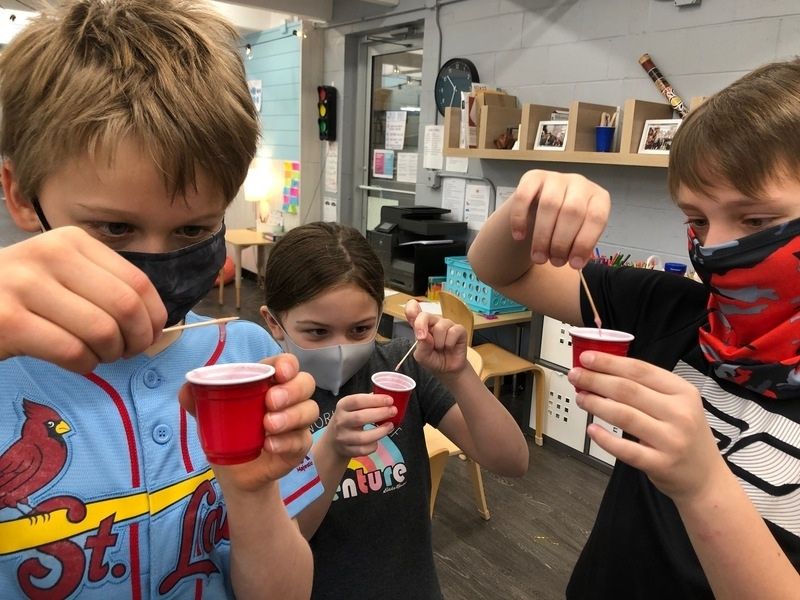
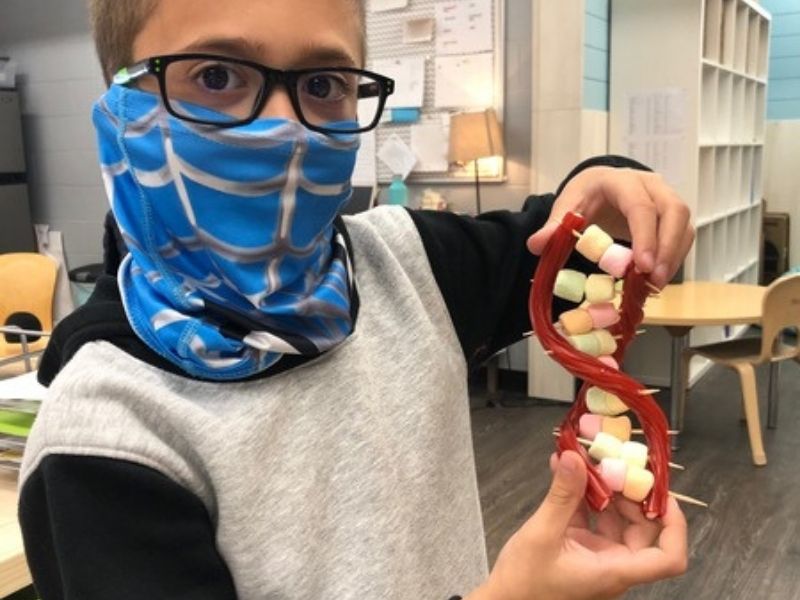
P.S. – Here are a few of our adventures in our current Human Body Quest! These learners are having a blast! 🙂

